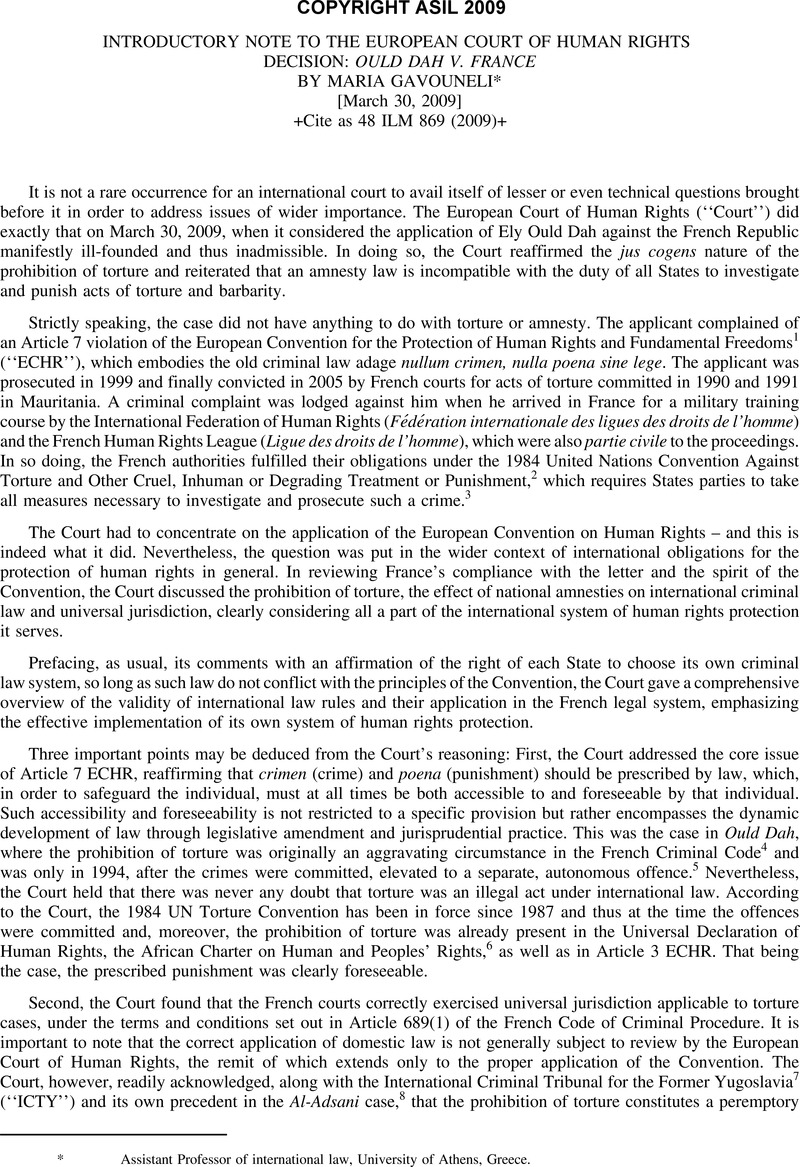No CrossRef data available.
Article contents
The European Court of Human Rights Decision: Ould Dah v. France
Published online by Cambridge University Press: 27 February 2017
Abstract

- Type
- International Legal Documents
- Information
- Copyright
- Copyright © American Society of International Law 2009
References
* This text was reproduced and reformatted from the text available at the European Court of Human Rights website: (visited August 17, 2009) <http://cmiskp.echr.coe.int/tkp197/view.asp?action=html&documentId=848780&portal=hbkm&source=externalbydocnumber&table=F69A27FD8FB86142BF01C1166DEA398649.
1 European Convention on the Protection of Human Rights and Fundamental Freedoms, Nov. 4, 1950, 213 U.N.T.S. 221, available at <http://www.coe.int/treaties.
2 United Nations Convention Against Torture and Other Cruel, Inhuman or Degrading Treatment or Punishment, G.A. Res. 39/46, U.N. Doc. A/RES/39/46, Dec. 10, 1984, 1465 U.N.T.S. 85 [hereinafter UN Torture Convention].
3 Id. arts. 6, 7. Indeed, the United Nations Committee Against Torture in its periodic report on France commended the French authorities on their textbook application of the principles of the Convention in the Ould Dah case; see Committee Against Torture, 35th Sess., U.N.Doc.CAT/C/FRA/CO/3, ¶ 14 (Apr. 3, 2006).
4 1810 C.PÉN.arts.303, 309.
5 Id. art. 221-1, as codified by Law No. 92-684 of July 22, 1992, entered into force Mar. 1, 1994.
6 The African Charter on Human and Peoples’ Rights, June 27, 1981, OAU Doc. CAB/LEG/67/3 rev. 5, 21 I.L.M. 58 (1982), available at <http://www.hrcr.org/docs/Banjul/afrhr.
7 Prosecutor v. Furundzija, Case No. IT-95-17/1-t, Judgment, ¶ 153 (Dec. 10, 1998).
8 Al-Adsani v. U.K., App. No. 35763/97, Judgment, ¶ 60 (Nov. 21, 2001), available at <http://www.hudic.coe.int.
9 Id. at 11.
10 Human Rights Committee General Comment on Article 7 of the International Covenant on Civil and Political Rights CCPR, replaces General Comment 7 Concerning Prohibition of Torture and Cruel Treatment or Punishment (Art. 7), 44th Sess. (Oct. 3, 1992), available at <http://www.ohchr.org/English/bodies/hrc/comments.
11 Furundzija, supra note 7, ¶ 155.
12 That was the cases of General Ricardo Miguel Cavallo, amnestied in Argentina but prosecuted in Spain for crimes against humanity; see Order of June 23, 2003, Audiencia Nacional [Court of First Instance of Madrid], available at <http://www.derechos.org/nizkor/arg/espana/#cav; see also Antonio Cassese, Is the Bell Tolling for Universality? A Plea for the Sensible Notion of Universal Jurisdiction, 1 J. Int’l Crim. Just. 589, 589-595 (2003); see also Juan Contreras Sepu´lveda et al., Corte Suprema, Case No. 517/2004, Decision 22267 (Nov. 17, 2004), available at <http://www.derechos.org.-nizkor/chile (discussing the rescission of the amnesty laws in Chile); see also Menno Camminga, Lessons Learned From the Exercise of Universal Jurisdiction in Respect of Gross Human Rights Offences, 23 Hum. Rts. Q. 940 passim (2001); NAOMI ROHT-ARRIAZA, THE PINOCHET EFFECT: TRANSNATIONAL JUSTICE IN THE AGE OF HUMAN RIGHTS (2005).
† Important legal notice: This is a courtesy translation by Isavella Maria Vasilogeorgi, LL.M. student at the University of Athens Law School. The official text of the decision is in French.
* This text was reproduced and reformatted from the text available at the European Court of Human Rights website: (visited August 17, 2009) <http://cmiskp.echr.coe.int/tkp197/view.asp>


